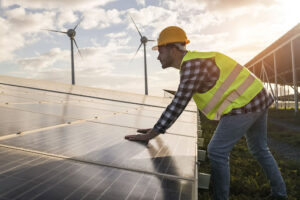 When considering the effective lifespan of a solar system, it’s important to keep in mind that the panel itself is only a single component. Each element of the system has its own longevity, which can be improved with regular maintenance and inspections.
When considering the effective lifespan of a solar system, it’s important to keep in mind that the panel itself is only a single component. Each element of the system has its own longevity, which can be improved with regular maintenance and inspections.
All system components will experience reduced efficiency over time, the speed of which is known as the ‘degradation rate’. According to the National Renewable Energy Laboratory, the median rate of degradation is 0.5%, meaning a system will only be producing 90% of its maximum output after ten years.
Solar panels
Solar panels, also known as PV (photovoltaic) panels, can be the longest-lasting components of a solar system. Despite this, the longevity of your solar panels depends on numerous factors which can make it hard to guarantee performance.
Ensure you choose high-quality panels installed by experienced professionals, as lower-quality panels may experience a higher degradation rate. On top of finding reputable solar energy companies, such as Solar System, ensure you conduct regular maintenance/cleaning of your system in accordance with manufacturer instructions.
Solar inverters
One of the most important components of your solar setup, the solar panel inverter converts the direct current (DC) output of the panel to alternating current (AC). This allows your home devices to make use of collected electricity. Tier 1 solar inverters from reliable solar companies in Sydney have been rated to last for 10 years, potentially improved with regular upkeep.
Ensure you choose a high-quality solar panel inverter that can compensate for the hotter temperatures in Australia. Trusted solar companies in Sydney can provide assistance with choosing the best solar inverter for your home.
The Clean Energy Council (CEC) even maintains a list of approved inverters and batteries that meet Australian Standards.
Solar batteries
An additional component for your system, solar batteries store energy collected by your PV panels for later use. You may wish to purchase a solar battery for periods when your panels aren’t producing enough energy to cover home electricity use, such as at night.
The lifespan of a solar battery is estimated between five and fifteen years but can be improved with regular maintenance. Periodic inspections can help you prevent potential problems to ensure your solar batteries are functioning as intended. Contact a solar energy installer near you to learn more about solar batteries.
Types of solar warranties
As a complete solar system features many interconnected components, it’s important to understand the types of warranties and what they cover.
Solar System, an experienced solar panel installer based in Sydney, offers generous warranty periods for their Tier 1 products.
Solar Performance Warranty
The solar performance warranty/solar output warranty refers to the loss of power generation over time through degradation. The 25-year warranty on solar panels often falls into this category. This warranty does not cover defects, workmanship problems, or faults.
Panel Product Warranty
Panel product warranties protect against defects or faulty materials that affect the intended performance of your solar system.
Inverter Product Warranty
Inverters are arguably the hardest working component of your system, operating at high voltages almost constantly, ensuring you have useable electricity. In case you need to take advantage of this warranty, choosing the right solar energy company for the installation, such as Solar System, is essential. If an inverter or panel isn’t installed according to manufacturer specifications, you may not be eligible for the warranty.
To book a free assessment with a solar energy installer near you, contact Solar System today.
